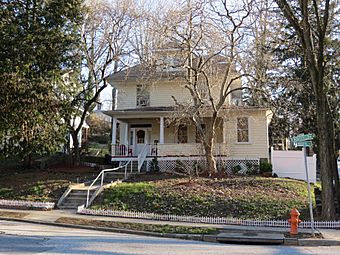Elmer V. McCollum House facts for kids
|
Elmer V. McCollum House
|
|
 |
|
| Location | 2301 Monticello Road, Baltimore, Maryland |
|---|---|
| Built | c. 1920 |
| NRHP reference No. | 76002182 |
Quick facts for kids Significant dates |
|
| Added to NRHP | January 7, 1976 |
| Designated NHL | January 7, 1976 |
The Elmer McCollum House is a special historic home located at 2301 Monticello Road in Baltimore, Maryland. Built around 1920, this house is important because of its connection to a famous scientist named Elmer McCollum (1879-1967). He lived here from 1929 to 1939. During these years, McCollum did amazing research that helped us understand how nutrition affects our health. The house became a National Historic Landmark in 1973.
What Does the Elmer McCollum House Look Like?
The Elmer McCollum House is in the Forest Park area of Baltimore. It's at the corner of Monticello Road and Windsor Hills Road. The house was built around 1920. It's a 2½-story building with a sloped roof that has windows sticking out (called dormers).
It has a front porch with round columns. The main entrance has windows on the sides of the door. Inside, the house has a side hall layout and has been divided into three separate apartments. Elmer McCollum lived in this house for ten years, which was longer than any other place he lived in Baltimore.
Who Was Elmer McCollum?
Elmer McCollum was a brilliant scientist who made huge discoveries about vitamins and nutrition. He was born in Kansas. He graduated from the University of Kansas in 1903. Then, he earned his PhD in chemistry from Yale University in 1906.
McCollum started his research into nutrition while teaching at the Wisconsin Agricultural Experimental Station. This is where he made his first big discovery: Vitamin A in 1913!
McCollum's Discoveries at Johns Hopkins
In 1917, Johns Hopkins University invited McCollum to teach there. He continued his important research on vitamins. His work led to the discovery of many of the B-complex vitamins. He also greatly increased our knowledge about diseases caused by not getting enough of certain nutrients, like rickets and scurvy.
Rickets is a disease that affects bones, making them soft and weak. Scurvy is caused by a lack of Vitamin C and can make people feel very tired and have bleeding gums. McCollum's work helped doctors understand how to prevent and treat these conditions.
In 1965, the American Society of Clinical Nutrition created an award named after him to honor his incredible contributions to science.




